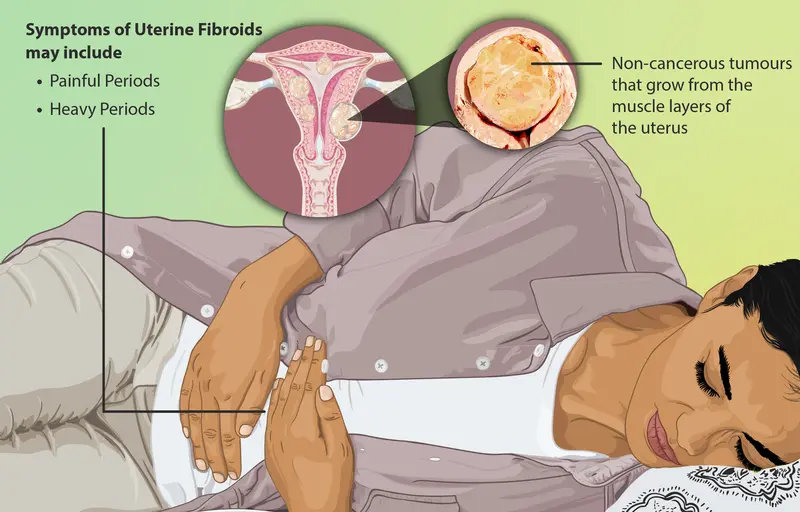Troubled by Heavy Periods or Pelvic Pain? It Might Be Fibroids.

If you’re facing irregular bleeding, painful periods, or unexplained pressure in your lower belly, it’s time to look deeper. You may be dealing with uterine fibroids—a common condition that affects up to 70% of women by the age of 50.
But First, Let’s Look at What a Uterine Fibroid is
Uterine fibroids (also called leiomyomas or myomas) are non-cancerous growths made up of muscle and fibrous tissue inside or around the uterus.
They can be:
- As small as a seed or as large as a grapefruit
- Single or multiple
- Silent or symptomatic
And yes, they’re common but they can sometimes still cause bigger problems—especially when it comes to pain, periods, and pregnancy.
Who Gets Fibroids?
Fibroids usually show up during the reproductive years (ages 30–50). Certain risk factors can increase your chances, such as:
- Family history (mother or sister with fibroids)
- Hormonal imbalances (high estrogen or progesterone levels)
- Lifestyle factors (being overweight, eating a lot of red meat, or being physically inactive)
Types of Fibroids (Based on Location)
- Intramural Fibroids: The most common. Found in the muscular wall of the uterus.
- Submucosal Fibroids: Found just beneath the uterine lining. Can lead to heavy bleeding and fertility problems.
- Subserosal Fibroids: Grow on the outer surface and may press on nearby organs like the bladder or bowel.
- Pedunculated Fibroids: Attached by a stalk—can grow either inside or outside the uterus.
What Causes Fibroids?
There’s no single cause, but likely contributors include:
- Estrogen & progesterone: These hormones help fibroids grow
- Genetic changes: Many fibroids contain gene mutations different from normal uterine cells
- Growth factors: For example, Insulin-like growth factor, which can promote fibroid growth
Interestingly, fibroids often shrink after menopause due to lower hormone levels. But that does not mean they can be left unchecked until you hit menopause.
Because Fibroids Can Affect Chances of Pregnancy
While many women with fibroids do have healthy pregnancies, sometimes larger fibroids or certain types can increase the likelihood of following risks:
- Miscarriage
- Preterm labor
- Placenta issues
- Delivery complications (especially if fibroids block the birth canal, leading to a C-section)
Symptoms of Fibroids
Some women never notice them and other women experience severe symptoms:
- Heavy menstrual bleeding (may cause anemia)
- Pelvic pain or pressure
- Frequent urination
- Painful intercourse
- Constipation or bloating
- Difficulty conceiving or recurrent miscarriages
How Are Fibroids Diagnosed?
A physical exam can reveal an enlarged uterus, but we confirm with imaging:
- Ultrasound: First-line, non-invasive test
- MRI: Helps map the size, number, and location of fibroids
- Hysteroscopy: A tiny camera is used to view the inside of the uterus
- Sonohysterography: Combines ultrasound with a saline solution for a clearer picture of submucosal fibroids
How Do We Treat Uterine Fibroids?
Not every fibroid needs surgery. Treatment depends on your symptoms, the size and location of fibroids, and whether you plan to get pregnant.
1. Medications
- Hormonal therapy: Pills or IUDs to reduce heavy bleeding
- GnRH agonists: Temporarily shrink fibroids by lowering estrogen
- Tranexamic acid: Helps control heavy menstrual bleeding
2. Minimally Invasive Options
- Uterine Artery Embolization (UAE): Cuts off blood supply to the fibroid, causing it to shrink
- Hysteroscopic surgery: Removes fibroids from the uterine cavity using a camera-guided instrument
- Myomectomy: Removes fibroids while preserving the uterus—ideal if you want children
3. Surgical Procedures
- Laparoscopic Myomectomy: Keyhole surgery to remove fibroids with minimal recovery time
- Hysterectomy: Removal of the uterus. Recommended only if other treatments fail and fertility is not a concern
Cost of Fibroid Treatment in Mumbai
Approximate costs:
- Myomectomy: ₹70,000 – ₹1,50,000
- Uterine Artery Embolization: ₹1,00,000 – ₹2,00,000
- Hysterectomy: ₹1,50,000 – ₹2,50,000
Prices may vary based on hospital, doctor’s expertise, and procedure type.
Ready to Feel Better?
If you’re living with painful periods, constant bloating, or fertility worries—you don’t have to anymore. See a specialist and take charge of your health.
